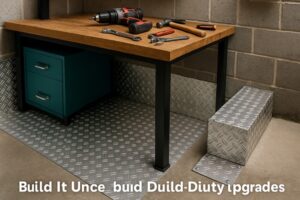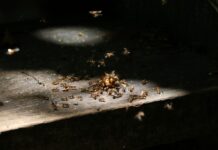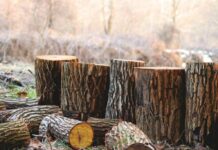
Some things around the house just need to last. Whether it’s a workbench, a shed floor, or a spot in the garage where tools get dropped all the time, using weak materials only leads to more repairs. And no one wants to keep fixing the same problem again and again.
That’s why it makes sense to use stronger materials right from the start. Not everything needs to be heavy or complicated, but it should be solid enough to handle daily use. There are smart ways to make home projects tougher without making them harder—and the best part is, these upgrades often last way longer than expected.
Use Materials That Can Take a Beating
When it comes to areas that get hit, stepped on, or pushed around every day, regular wood or plastic doesn’t always hold up. Over time, they scratch, bend, or start to fall apart. That’s where metal comes in—especially materials made for strength and grip.
A good example is aluminium chequer plate. Some people use it on floors or ramps, but it’s useful in lots of other places too. One smart option is to use a custom cut aluminium chequer plate to fit specific areas that need support—like under heavy toolboxes, on stair treads, or across wall sections that get banged up often.
This kind of plate is lightweight but strong. It doesn’t rust, it’s easy to clean, and it handles pressure without bending. The raised pattern also adds grip, which helps prevent slipping—especially in sheds or garages that get wet or dusty.
Reinforce the Floor Before It Starts to Break
Shed and garage floors are usually made of concrete or wood, and both can wear down fast in certain areas. One spot gets stepped on more than the rest. Another gets scratched up by moving equipment. And if water leaks in or oil spills happen, they soak in and make everything worse.
That’s why covering the most-used parts with something tougher is a smart move. Aluminium chequer plate sheets can be placed in front of workbenches, next to doorways, or under anything that gets dragged around. This stops the original floor from getting damaged and makes cleaning way easier.
These upgrades aren’t just about safety or looks—they save time. Once the metal is in place, the floor underneath doesn’t need to be touched again for years.
Build a Work Surface That Won’t Quit
A workbench is the heart of most DIY setups. But it takes a beating. Cutting, hammering, spilling paint, dragging tools—sooner or later, a wooden surface shows wear. Even thick boards get chipped and stained after enough use.
Instead of replacing the whole thing, a better idea is to top it with aluminium chequer plate. It turns a soft surface into a solid one, gives better grip for tools and parts, and helps keep the area clean. It’s also heat-resistant, which means no damage if something hot touches it.
Once it’s screwed down, the surface doesn’t move. It can handle pressure, sharp tools, and messes without falling apart.
Protect Your Walls from Scrapes and Scuffs
Walls in garages, sheds, and utility rooms often get ignored. But those are the same walls that end up marked by ladders, bikes, bins, or garden gear. Eventually, the corners start to chip, and paint peels off from repeated knocks.
Covering part of the wall with chequer plate turns that weak spot into a tough one. Whether it’s a small corner guard or a larger sheet, it keeps things looking clean and stops further damage. Even if something hits it hard, the metal holds firm and doesn’t need repainting.
This works well in storage rooms or anywhere that sees a lot of movement. It’s also useful behind workstations where tools or parts might bump into the wall regularly.
Make Steps and Ramps Safer
Steps and ramps can get dangerous when they’re smooth or wet. Even concrete or wood doesn’t always provide good grip. If it rains or there’s mud, slipping becomes a real risk.
Adding strips of chequer plate to step edges or ramp surfaces helps prevent that. The textured surface gives grip without getting in the way. It’s strong enough to handle foot traffic, wheels, or even trolleys being pushed up and down.
It also adds durability to the edge, which is often the first part of a step to break down. With metal covering it, the step or ramp lasts longer and stays safer.
Smart Storage Upgrades That Last
Heavy-duty storage doesn’t just mean bigger shelves. It means shelves and cabinets that don’t bend or break under pressure. One way to make storage stronger is to use aluminium chequer plate on drawer bottoms or shelf surfaces.
This spreads the weight evenly, stops sharp edges from cutting into the base, and keeps everything sturdy. It also helps with sliding—metal surfaces make it easier to move boxes or containers without scraping wood underneath.
These changes might seem small, but they make storage areas easier to use and way more dependable.
One Material, a Lot of Solutions
Aluminium chequer plate is one of those materials that works in more places than people expect. It adds strength, improves safety, and looks clean even after years of use. Whether it’s on the floor, on a bench, or along a wall, it stays solid without needing constant care.
Since it doesn’t rust and doesn’t hold moisture, it works well indoors or outdoors. And because it’s lightweight, it’s easier to install than other metals. Just cut it to size, screw it down, and it’s ready to go.
That’s what makes it so useful for projects that are meant to last.
Upgrades That Actually Stick Around
Some upgrades look good at first but don’t last. Paint chips. Wood cracks. Plastic warps. Then you end up fixing the same area again a few months later.
That’s why using stronger materials from the beginning is worth it. Heavy-duty upgrades save time and effort. Once they’re in place, they don’t need much attention. They just keep working.
Choosing something like aluminium chequer plate isn’t about going over the top—it’s about picking what makes sense for spots that take a lot of use. Build it once, and build it right. The result is a space that’s easier to use, safer to move around in, and way less likely to fall apart.







